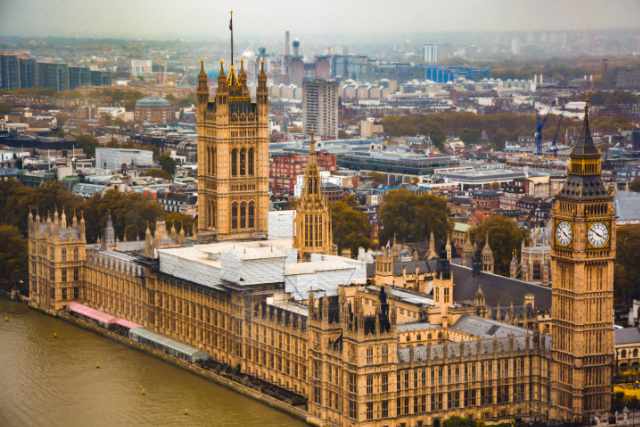Christmas and the year-end period can be a stressful time for business owners. However, it’s also a great time to take stock and reflect on the past in order to get ready for a prosperous new year! In this article, we look back over the last four Christmases and the lessons you can learn from each one.
- Christmas can be a challenging time for many businesses - however it’s a great time to reflect on lessons learnt.
- Past Christmases have thrown up challenges, from political upheavals to global health crises, but we’ve seen that even the toughest of challenges can be overcome.
- It’s important to stay agile, stay competitive, and stay positive - and to learn the lessons of Christmases past to ensure your business is in the best position for a bright future.

2019: Brexit looms
In 2019, after three years of negotiations, then-PM Boris Johnson pledged to “get Brexit done” by the end of January 2020. With little clarification on what this meant for British businesses, or the British public as a whole, 2019 saw a Christmas of uncertainty.
But the market reacted in unexpected ways. Consumers refused to let Brexit fatigue dampen their festive spirits, and 44% planned to spend more on a Merry Christmas than they did in the previous year. These plans were realised, with average spending rising from £560 to £567 per person from 2018 to 2019.
The lesson? Make data-driven decisions
Customer behaviours can be unpredictable, so data can help you make better decisions.
Relying solely on your own instincts could leave you exposed to risk or cause you to miss out on opportunities. While many thought Brexit would have a negative impact on Christmas in 2019, the data told another story. Pairing your prior knowledge and experience with data will ensure you see the full picture and are able to act rather than react. As well as predicting customer behaviour, data can be used to inform a huge range of everyday decisions, from fraud detection to debt collection.
2020: Worldwide health crisis
Christmas 2020 saw a drop in spending, but for good reason. A devastating pandemic, Covid-19 caused chaos as countries battled to contain the spread of the virus.
Overnight, UK businesses had to change the way they operated against a background of continuously evolving policies and procedures. Lockdown restrictions were eased on December 2nd, only to be tightened on December 20th. Uncertainty prevailed, with travel restrictions and business closures playing havoc with the production and sale of goods and services.

The lesson? Embrace unexpected opportunities
In what was a very difficult time for businesses, many took the need for change in their stride – sit-in restaurants began to offer takeaways, music venues began live-streaming performances. Gyms launched digital fitness classes and fashion designers came together to make and distribute scrubs to healthcare staff.
Business owners were keen to seize new opportunities too. The number of UK start-ups exploded during the pandemic with 22% more companies registered in the first year of the pandemic compared to the previous year. The CBI reported that more than £20 billion could be added to the UK economy in the future from pandemic-born businesses.

2021: Aftermath of a pandemic
With the Coronavirus seemingly in the rear-view mirror by December 2021, the world economy was still recovering. With governments winding down furlough schemes and other support, some businesses were hesitant to spend money on recruitment and talent retention.
Those who didn’t invest saw even more problems as dissatisfied workers decided that under resourced roles with static wages didn’t appeal. Over two million workers planned to change jobs before Christmas, leading to staff shortages across multiple sectors.
The lesson? Your people are your biggest asset.
Focus on a positive workplace culture for your employees, ensuring a work-life balance and a competitive compensation package in order to retain top talent. Not only will this help to reduce employee churn, but a study by Harvard Business Review has found that employee satisfaction does impact your bottom line.
Their study involving a global retail brand found that improvements in employee experience metrics in particular instances increased revenue by more than 50%, and profits by nearly as much.
2022: Unrest in Eastern Europe
Tensions in Eastern Europe reached highs not seen for over a century and Russia launched an invasion of Ukraine. Western sanctions on Russia resulted in restricted access to fossil fuels and spiralling costs across Europe.
In the UK, supply chain disruptions and rising heating costs led to lower consumer spending and rising manufacturing costs, especially in the winter months. Even things as seemingly innocuous as a Christmas tipple became cause for concern with a looming beer shortage harming the hospitality sector ahead of what should’ve been a bumper festive period with a winter World Cup.

2023: Looking ahead
Despite bold tax cuts in November, a continued cost of living crisis has led to an unprecedented squeeze on household incomes. Consumer spending is set to drop, with up to two thirds of people planning to trim their Christmas budgets.
But spending isn’t the only issue, business owners report that cash flow worries are translating into mental health worries too. Burnout and mental-health difficulties are becoming an increasingly prevalent threat to businesses. Research by Xero and the Centre for Economic Business Research found that 92% of business owners reported experiencing symptoms of poor mental health.
The lesson? Look after yourself this Christmas.
While the festive period can be tough for business owners, if we’ve learned anything from recent Christmases it’s that we’re incredibly resilient! Take some time to celebrate your achievements this year. Thinking about what you’ve accomplished will leave you well placed to usher in the new year, ready to take on all the exciting opportunities that 2024 will offer.
Protect your business in 2024
The festive period can provide some much-needed downtime to take a step back, assess the year gone by, and begin to plan for the year ahead. Reviewing the lessons you’ve learned over past years can highlight areas of your business that may be in need of greater protection.
Taking out trade credit insurance is one way to add an additional layer of security to your business. Our market leading insurance can provide you with peace of mind, safe in the knowledge that your cash flow is protected. To learn more about the products we offer, get in touch.
You might also be interested in…
Benefits of exporting – and risks SMEs need to know
Late payments: how to collect and avoid them
Build your export strategy with Allianz Trade with our Trade Match open source export data
Let's talk...
For a free credit insurance consultation call our UK team, 09:00-17:00 Mon-Fri.

Our expertise and commitment
Allianz Trade is the global leader in trade credit insurance and credit management, offering tailored solutions to mitigate the risks associated with bad debt, thereby ensuring the financial stability of businesses. Our products and services help companies with risk management, cash flow management, accounts receivables protection, Surety bonds, Business Fraud Insurance, debt collection processes and e-commerce credit insurance ensuring the financial resilience for our client’s businesses. Our expertise in risk mitigation and finance positions us as trusted advisors, enabling businesses aspiring for global success to expand into international markets with confidence.
Our business is built on supporting relationships between people and organisations, relationships that extend across frontiers of all kinds - geographical, financial, industrial, and more. We’re constantly aware that our work has an impact on the communities we serve and that we have a duty to help and support others. At Allianz Trade, we’re strongly committed to fairness for all without discrimination, among our own people and in our many relationships with those outside our business.



